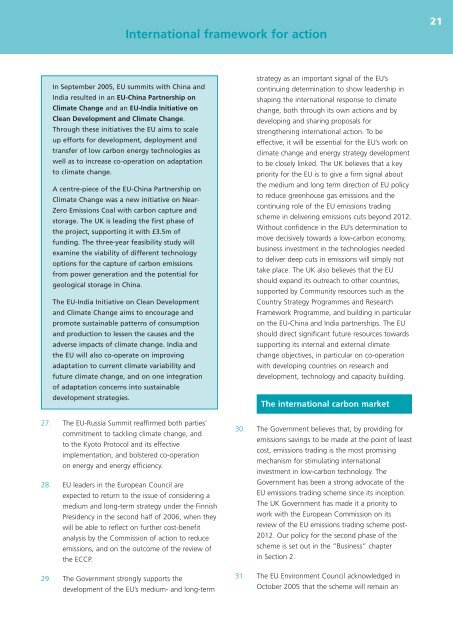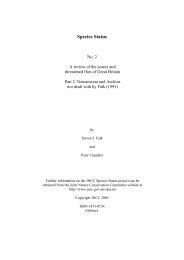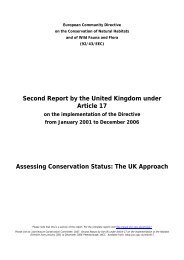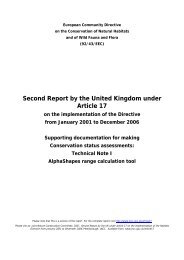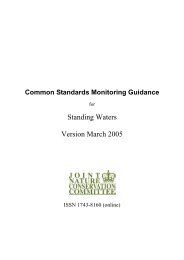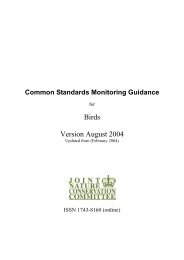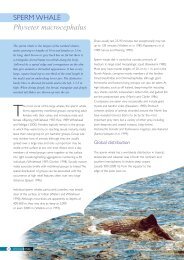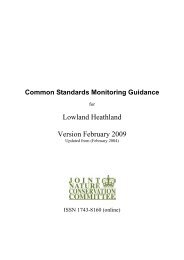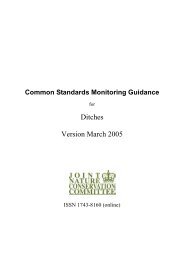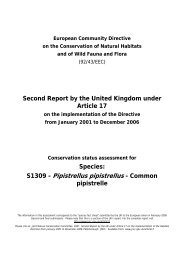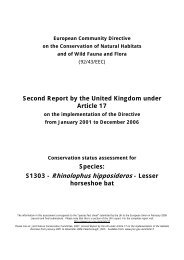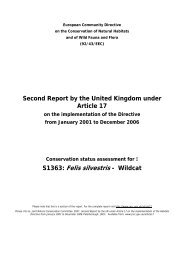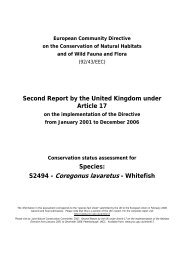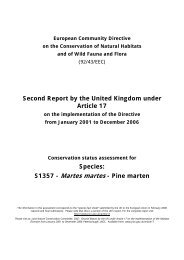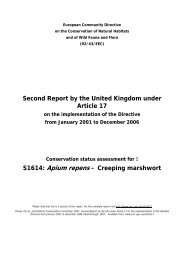UK Climate Change Programme 2006 - JNCC - Defra
UK Climate Change Programme 2006 - JNCC - Defra
UK Climate Change Programme 2006 - JNCC - Defra
You also want an ePaper? Increase the reach of your titles
YUMPU automatically turns print PDFs into web optimized ePapers that Google loves.
International framework for action<br />
21<br />
In September 2005, EU summits with China and<br />
India resulted in an EU-China Partnership on<br />
<strong>Climate</strong> <strong>Change</strong> and an EU-India Initiative on<br />
Clean Development and <strong>Climate</strong> <strong>Change</strong>.<br />
Through these initiatives the EU aims to scale<br />
up efforts for development, deployment and<br />
transfer of low carbon energy technologies as<br />
well as to increase co-operation on adaptation<br />
to climate change.<br />
A centre-piece of the EU-China Partnership on<br />
<strong>Climate</strong> <strong>Change</strong> was a new initiative on Near-<br />
Zero Emissions Coal with carbon capture and<br />
storage. The <strong>UK</strong> is leading the first phase of<br />
the project, supporting it with £3.5m of<br />
funding. The three-year feasibility study will<br />
examine the viability of different technology<br />
options for the capture of carbon emissions<br />
from power generation and the potential for<br />
geological storage in China.<br />
The EU-India Initiative on Clean Development<br />
and <strong>Climate</strong> <strong>Change</strong> aims to encourage and<br />
promote sustainable patterns of consumption<br />
and production to lessen the causes and the<br />
adverse impacts of climate change. India and<br />
the EU will also co-operate on improving<br />
adaptation to current climate variability and<br />
future climate change, and on one integration<br />
of adaptation concerns into sustainable<br />
development strategies.<br />
27. The EU-Russia Summit reaffirmed both parties’<br />
commitment to tackling climate change, and<br />
to the Kyoto Protocol and its effective<br />
implementation, and bolstered co-operation<br />
on energy and energy efficiency.<br />
28. EU leaders in the European Council are<br />
expected to return to the issue of considering a<br />
medium and long-term strategy under the Finnish<br />
Presidency in the second half of <strong>2006</strong>, when they<br />
will be able to reflect on further cost-benefit<br />
analysis by the Commission of action to reduce<br />
emissions, and on the outcome of the review of<br />
the ECCP.<br />
29. The Government strongly supports the<br />
development of the EU’s medium- and long-term<br />
strategy as an important signal of the EU’s<br />
continuing determination to show leadership in<br />
shaping the international response to climate<br />
change, both through its own actions and by<br />
developing and sharing proposals for<br />
strengthening international action. To be<br />
effective, it will be essential for the EU’s work on<br />
climate change and energy strategy development<br />
to be closely linked. The <strong>UK</strong> believes that a key<br />
priority for the EU is to give a firm signal about<br />
the medium and long term direction of EU policy<br />
to reduce greenhouse gas emissions and the<br />
continuing role of the EU emissions trading<br />
scheme in delivering emissions cuts beyond 2012.<br />
Without confidence in the EU’s determination to<br />
move decisively towards a low-carbon economy,<br />
business investment in the technologies needed<br />
to deliver deep cuts in emissions will simply not<br />
take place. The <strong>UK</strong> also believes that the EU<br />
should expand its outreach to other countries,<br />
supported by Community resources such as the<br />
Country Strategy <strong>Programme</strong>s and Research<br />
Framework <strong>Programme</strong>, and building in particular<br />
on the EU-China and India partnerships. The EU<br />
should direct significant future resources towards<br />
supporting its internal and external climate<br />
change objectives, in particular on co-operation<br />
with developing countries on research and<br />
development, technology and capacity building.<br />
The international carbon market<br />
30. The Government believes that, by providing for<br />
emissions savings to be made at the point of least<br />
cost, emissions trading is the most promising<br />
mechanism for stimulating international<br />
investment in low-carbon technology. The<br />
Government has been a strong advocate of the<br />
EU emissions trading scheme since its inception.<br />
The <strong>UK</strong> Government has made it a priority to<br />
work with the European Commission on its<br />
review of the EU emissions trading scheme post-<br />
2012. Our policy for the second phase of the<br />
scheme is set out in the “Business” chapter<br />
in Section 2.<br />
31. The EU Environment Council acknowledged in<br />
October 2005 that the scheme will remain an


